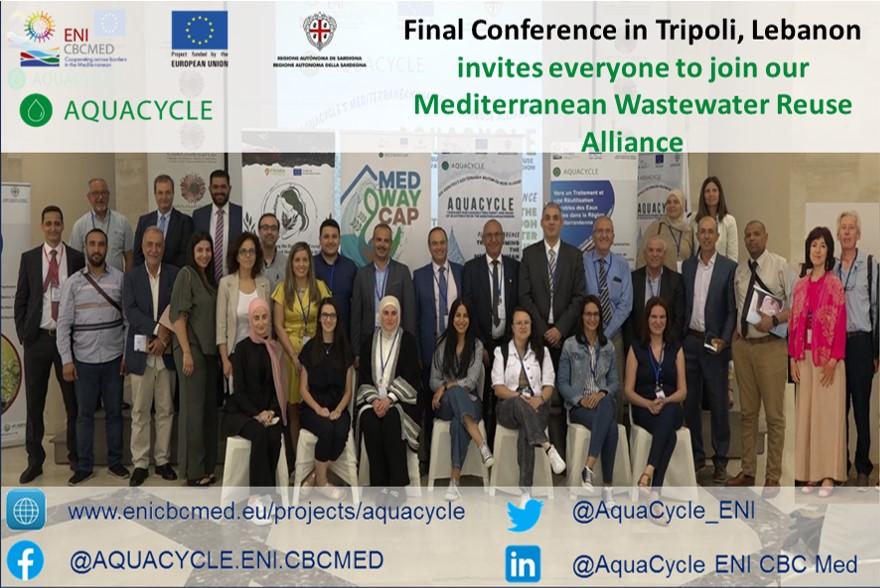AQUACYCLE invites everyone to join its Mediterranean Wastewater Reuse Alliance

The Final Conference of the ENI CBC Med funded AQUACYCLE project place at the Chamber of Commerce, Industry & Agriculture in Tripoli, Lebanon during 23 to 24 June 2023. The event, organized by the Lebanese University (LU) under the Patronage and Presence of the Minister of Environment, Dr. Nasser Yassin, was joined by over 200 participants and received extensive media coverage, including Lebanon’s national TV channel "TeleLiban" which can be accessed through this link.
Watch further snippets from the Final Conference which have been collected in this short video clip and read up on the proceedings in this report, both of which have been prepared by the Lebanese University team.
The event foremost created the opportunity to invite everyone to sign up to the project’s Charter.
Indeed, water, and especially access to water, simply concerns everyone – by signing up to our Charter you will be joining our Mediterranean Wastewater Reuse Alliance. The content of the Charter can be downloaded in English, French and Arabic, while the registration form to sign up to the Charter can be accessed through this link.
The AQUACYCLE partnership strives for a world where water is cherished, conserved and revitalized. We call on policy- and decision makers to heed the voices of farmers from around the Mediterranean who are in dire straits to sustain their rural livelihoods due to their having less and less access to freshwater. The AQUACYCLE partnership brings an eco-innovative wastewater treatment solution which offers benefits beyond those achievable with conventional treatment systems. Our successful endeavours have been documented in a Charter which brings the voices of farmers and local communities from around the project’s pilot demonstration sites in Lebanon, Spain and Tunisia, who actively partook in the project’s stakeholder engagement activities through interviews, surveys and workshops.
In this news post, we also wish to share the full content of a press release that was issued by the Lebanese University following the successful conclusion of the project’s Final Conference.
- Press Release marking the successful conclusion of the AQUACYCLE Conference
-
Farmers around the Mediterranean, including farmers in Lebanon, have drawn our attention that they are having less and less access to freshwater. The AQUACYCLE project brings an eco-innovative solution in the form of a three-stage wastewater treatment system. Moreover, this system brings multiple benefits beyond what conventional treatment systems can offer.
The first stage known as anaerobic digestion additionally produces biogas and sludge that can be reutilized as fertilizer in agriculture. The second stage consists of one or more constructed wetlands which thrive as a biodiversity habitat, and thus bring a clear example of a climate change mitigation measure. Last but not least, the third stage of the treatment system is a raceway pond reactor. This component guarantees the disinfection of the treated effluent to a level that complies with the new EU regulation concerning the minimum requirements for the reuse of treated effluent.
This means that the eco-innovative wastewater system supplies a treated effluent that is safe for reuse in irrigated agriculture. These results have been validated at the pilot demonstration unit that has been constructed in the region of Murcia in Spain. A similar demonstration plant is being constructed in Deddeh Koura with a foreseen completion date by the end of August 2023. It is important to note that the use of nature-based solutions in the form of constructed wetlands and the use of solar energy for disinfection result in lower operation and maintenance costs as compared with conventional wastewater treatment systems.
The Aquacycle project is not just about technological advancements; it is also about fostering collaboration and sharing knowledge across borders. It encourages partnerships between governments, academia, private sector, NGOs, and local communities, facilitating the transfer of expertise and creating a global network of water stakeholders.
The Aquacycle project thus represents a pivotal moment in our collective journey towards sustainable development. It is an opportunity to reshape our relationship with water and leave a lasting positive impact on future generations. Let us join forces and embrace this project, as we strive for a world where water is cherished, conserved, and revitalized.
To this effect, the voices of farmers and of the rural local communities around the pilot demonstration units in Lebanon, Spain and Tunisia have been collected in a Charter. This Charter documents their growing concerns to sustain their livelihoods in the face of increased water scarcity and their expectations from the project’s wastewater treatment system. Today, the participants at this Final Conference have been invited to join a Mediterranean Wastewater Reuse Alliance by signing up to this Charter.









